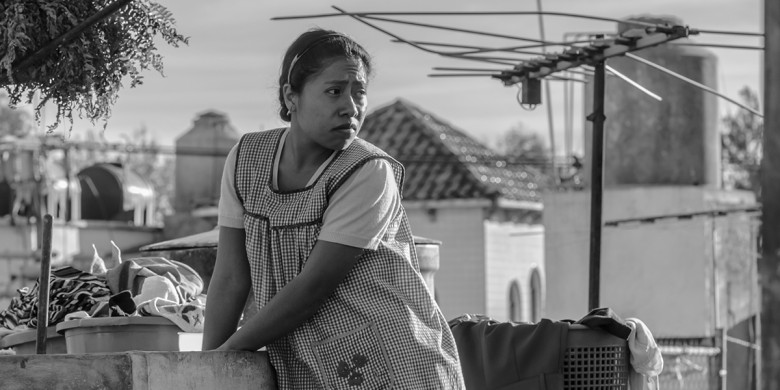With its current 96% fresh rating at Rotten Tomatoes as of this writing (the overwhelming majority of critics weighing in being from the white male demographic unsurprisingly), many anointing it the best movie of the year, Alfonso Cuarón’s Oscar contender Roma has sure been getting a lot of love. Beautifully crafted, the film is based on the director’s own memories of growing up amidst the early ’70s political turmoil of Mexico, in a fairly well off household that employed a beloved maid/nanny named Libo – who the film’s main character Cleo is based on.
Which is also where the tone-deaf difficulties start. For as lovely as this feel-good movie is to look at, I found Cuarón’s cliché-ridden portrayal of his heroine unbearably cringe-worthy to watch.
At heart, the main problem with Roma is that Cleo (played by a luminous but near mute Yalitza Aparicio), with little backstory or character development, isn’t a flesh-and-blood human being who expresses her own thoughts and feelings so much as a romanticized blank slate. She’s merely a cipher seen through the white (or in Cuarón’s case, light-skinned, non-indigenous Mexican) male gaze. Cleo’s a one-dimensional symbol, whatever the director – and his equally well-off audience – wants her to be. Which in turn makes Roma feel nearly exploitative.
We only catch glimpses of Cleo’s life outside of the home she serves in, a place where she’s treated like a “family member” in the same way household nannies historically have been treated like “family members” going all the way back to the Civil War south. Indeed, the character seems to have quite a bit in common with Hattie McDaniel’s Mammy in Gone with the Wind. In the case of Cleo she’s an economic slave of indigenous descent, existing in a gilded cage (with weekend furloughs), reduced to convenient stereotypes by those in power both onscreen and off, seeking to cast themselves as the good guys.
Are we supposed to applaud the educated, soon-to-be divorcée Sofía (a stand-in for Cuarón’s own mom, expertly played by Marina de Tavira) in her attempt to feminist bond with Cleo as her marriage hits the rocks and the young domestic finds herself pregnant and similarly abandoned? Are we supposed to ignore the perpetuated invisibility of the working class and give Cuarón an Oscar because the film is stunningly shot and edited? Perhaps Cuarón’s memory piece would be less objectionable were there more indigenous and blue-collar artists of his international profile telling their own tales.
But alas, in the same way that Brazilian photojournalist Sebastião Salgado’s breathtaking images of starving children both woke the world to global poverty and aestheticized it (i.e., “poverty porn”), Roma likewise brings up uncomfortable ethical issues. We see the poor but don’t actually see them. The target audience of liberal elites can both bear witness to, and feel false empathy for, characters they’ve projected their own preconceived notions onto. And in this sense, Roma is equal parts gorgeous and extremely simplistic and immature. It’s white savior complex filmmaking at its finest.

